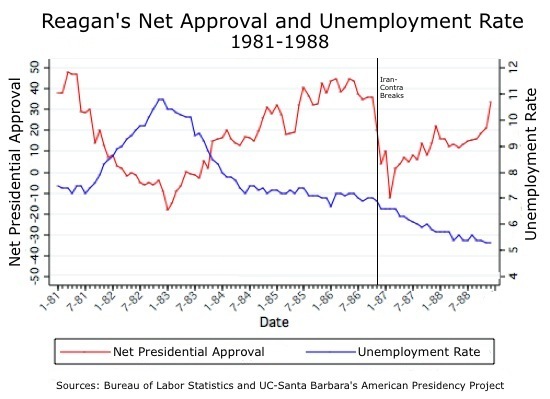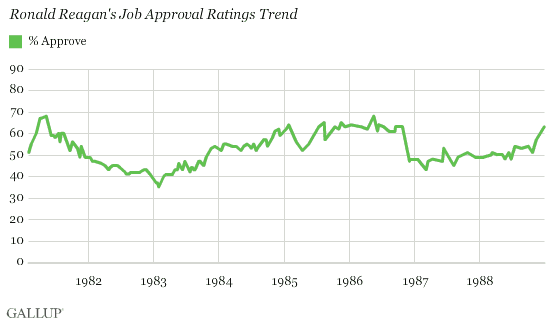Last Sunday marked the centennial of Ronald Reagan’s birth. The anniversary occasioned numerous tributes and remembrances, most of which noted Reagan’s celebrated skills as the “Great Communicator” and his reputation for developing a “Teflon Presidency” – one that somehow escaped blame for the economic problems of the day. That latter sobriquet was coined by Democratic Congresswoman Pat Schroeder in a 1983 speech on the House floor, when she said of then President Reagan: “He has been perfecting the Teflon-coated presidency: He sees to it that nothing sticks to him.” Schroeder’s exasperation was shared by many Democrats at the time, and it is a characterization that, as last Sunday’s remembrances indicates, has only grown more widespread through the intervening years.
What is the source of the Teflon-like qualities attributed to Reagan’s presidency? In a editorial in Sunday’s USA Today, Schroeder explains: “Why was Reagan so blame-free? The answer can be found in the label that did stick to him — “The Great Communicator. Reagan’s ability to connect with Americans was coveted by every politician. He could deliver a speech with such sincerity. And his staff was brilliant in playing up his strengths. They made sure the setting for any speech perfectly captured, re-emphasized and embraced the theme of that speech. And, let’s be honest, Reagan told people what they wanted to hear.”
She concludes: “…Reagan’s incredible ability to communicate and his staff’s genius in exploiting that ability are the reasons his presidency will be sealed forever in a Teflon coat.”
Schroeder’s characterization, as Sunday’s remembrances remind, is shared by many. It is also completely wrong. In fact, Reagan did not escape blame for the economic recession, high unemployment and other problems that occurred on his watch. Instead, the dynamics driving changes in his popularity were largely the same as those governing approval ratings of most presidents – including Barack Obama. Note that he left office with a lower average approval rating (based on Gallup polling) than his three successors: George H.W. Bush, Bill Clinton and George W. Bush. That average, of course, masks tremendous variation in his month-to-month ratings, as these Gallup Poll surveys indicate:
It is true that he left office slightly more popular than when he entered – one of the very few modern presidents who can make this claim. But clearly his popularity was not static. Instead, we see a slow but steady decline from a peak of near 70% shortly after the failed attempt on his life early in his administration to a low of 35% in January, 1983. Thereafter it begins a steady rise before enduring a steep, sudden decline in 1985. That is followed by a slight recovery to a peak of 68% in May of 1986, but he suffers another decline in 1987 that brings him down to about 50%, where he remains until benefiting from the typical post-election bounce as a lame duck president.
So much for the approval numbers. What explains them? Greatly simplified, the answer is jobs and Iran-contra. Consider the following chart (courtesy of Jay Cost).

We see that Reagan’s net popular approval (approval minus disapproval) is almost the mirror image of the national unemployment rate – when unemployment goes up, his net approval drops. And for most of his first term, the nation was experiencing a severe job loss, one largely induced by the Fed’s stringent monetary policies designed to wring inflation out of the economy. The result was that by 1982 unemployment had reached record post-World War II levels, averaging 9.7%, and remaining high, at 9.6% on average through 1983. Even though inflation dropped from a yearly average of 9.2% in 1981 to 3.8% in 1983, Reagan paid a steep political price for the job loss, despite the fact that the economic conditions were arguably driven more by the Fed’s actions than by his. The Republican Party also suffered, losing 26 seats in the 1982 midterm elections despite raising far more money than Democrats. This was a bigger than typical midterm loss (although smaller than one might expect given the horrendous unemployment figures). It was not until job growth began that Reagan’s approval ratings reversed course, and he cruised to reelection with a landslide victory in 1984.
The Iran-contra affair – Reagan’s ill-fated attempt to trade arms for hostages, and to funnel “residual” payments to the contras in Nicaragua – provided the second huge influence on Reagan’s popularity. When that scandal broke in 1985, Reagan suffered the greatest one-month drop in approval ever recorded for any president. Although he regained some of that support, he suffered another hit when the Democratically-controlled Congress released its summary report of the affair, which roundly criticized Reagan, in 1987.
The mistaken belief that Reagan’s presidency exhibited Teflon-like qualities is more than a misreading of history – it also contributes to a misperception regarding Obama’s popularity. Early in his first term, when his approval ratings remained above 60% despite high unemployment, political analyst Steve Kornacki wondered whether Obama was exhibiting a Reaganesque-Teflon touch. As Obama’s approval ratings began a steady decline, however, analysts changed their tune, with many pondering why Obama had suddenly lost the communication mojo that had characterized his successful presidential campaign. Some even suggested that the public – influenced by unusually negative news coverage – was holding Obama to a more stringent standard, in part due to his race. After all, Reagan had also experienced high unemployment, but his approval ratings – thanks to that mystical “Teflon” – seemingly remained impervious to the bad news.
Alas, those who misread history are condemned to misuse it. Obama – like the Great Communicator before him – has discovered that no amount of “hope and changey” rhetoric can overcome the negative political impact of persistent 9-plus unemployment. A Teflon presidency? That’s the wrong material. Think Velcro instead – when problems of national magnitude occur – they stick to the President, whether justified or not. If Obama is to make a Reagan-like political recovery, it won’t be because he suddenly rediscovers his communication skills – it will be due to a steady drop in the unemployment rate.


Prior to the 1987 elections Congress WAS NOT controlled by the GOP. The Senate was controlled by Republicans, the House by Democrats.
The report most damaging to Reagan was the one released by Special Prosecutor and former Republican Judge, Lawrence Walsh. See
http://www2.gwu.edu/~nsarchiv/NSAEBB/NSAEBB462/
Barney,
Reread my post. I never claimed the Republicans controlled Congress. As for the Walsh report, it was thorough, exhaustive, but didn’t do much to Reagan’s reputation so much as it did to G. H. W. Bush’s.